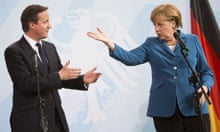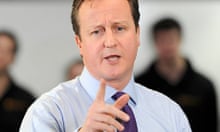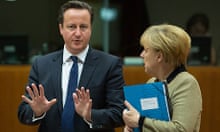David Cameron has been warned that he risks leading Britain out of the European Union by accident because he has misread the willingness of fellow EU leaders to concede to his demands for a looser European union.
Lord Kerr of Kinlochard – who was at the heart of Britain's team during the Maastricht treaty negotiations in 1991 – fears the UK is facing "bust-up time" with the other 26 EU countries.
He is one of a group of pro-Europeans, including Lords Heseltine, Mandelson and Brittan, expressing their concerns that Cameron is miscalculating Europe's determination to keep the current EU project intact, without the UK if necessary.
Cameron is due within weeks to indicate that after the next general election he would be prepared to hold a referendum on a new EU settlement – after repatriating powers during treaty negotiations aimed at underpinning eurozone governance.
But the strength of the remarks by the pro-European grandees is a stark reminder to Cameron that domestic pressure over Britain's relations with the EU will not just come from his Eurosceptic wing.
Kerr, who was Foreign Office permanent secretary between 1997 and 2002, told the Guardian: "I think that the Cameron strategy, if he was back in Downing Street with a majority, could lead to our leaving by accident. I think there is an analytical error."
Kerr's intervention, on the final day of a Guardian series on the EU, follows a warning by the European council president, Herman Van Rompuy, that Cameron's plans could unravel the EU.
Kerr, who was the lead British official in Brussels during the Maastricht treaty negotiations in 1991, says the Conservatives believe that all Britain's EU partners will agree to Cameron's demands in 2015 at an intergovernmental conference (IGC).
"I think they genuinely believe people are going to leap to their feet to sing Ode to Joy or Rule Britannia and it is a done deal. And then we will have a referendum on this new deal.
"But supposing the rest of the EU don't leap to their feet? It doesn't take one lonely Czech. It takes them all. This is an IGC, so it is unanimity rules. They have all got to agree every word of the changes we want.
"You could find yourself in an awkward situation in which you are stuck with a referendum pledge on the new deal and there is no new deal, or there is a new deal so trivial that it is mocked by Ukip and the press. In either scenario, it seems to me there is a risk that Cameron finds himself arguing we must go. I am sure that it is not what he wants to do."
Warning of "nasty" and "horrible" negotiations, he added: "It sounds more like bust-up time."
Lord Mandelson, the former Labour business secretary, warned Cameron of the forces he is unleashing inside the Conservative party: "It will be a very unattractive circus, rather as the Conservative party became under John Major in the 1990s."
The former EU trade commissioner said Cameron had next to no chance of succeeding. "We are in no position unilaterally to impose new terms of membership on the other 26 members of the EU. What he's really saying is he wants to remain in Europe but detached from it, in it but to all intents and purposes out of it. And there is no reason why the other 26, soon to be 27, members of the EU would agree to that. And from their point of view they shouldn't. It would start the rapid disintegration of the European Union.
"He's not going to win by pointing a gun at everyone else's heads. Patience with Britain, tolerance of this in-but-out approach, is now very thin indeed. If it came to it they would realise that they had to regroup with all the members of the EU bar Britain that were prepared to commit to the European Union and leave Britain out."
Brittan, a former trade commissioner, described a referendum as a "Bonapartist device" inconsistent with parliamentary democracy and questioned Cameron's negotiating strategy. "All negotiations are trades. Any British government that wants to do that has got to ask itself the question: what are we going to offer in return? I haven't heard any answer to that question. Maybe it is premature."
Lord Heseltine, the former Conservative deputy prime minister, said Britain had constantly underestimated Europe's determination to make the EU and the euro work. "They read the British press, they read the speeches, they know what's being said and they don't detect in us a partner for the venture they have undertaken. And therefore they are faced with a dilemma. They want us there. But they want us there as partners with commitment. There is the fear that our initiatives are not to strengthen the venture but to act contrary to it."
Heseltine said he feared that Britain's semi-detached status allowed Germany to dominate the EU. "I just see the German chancellor becoming more and more the leader of Europe. And I'm not in the business of that happening at the expense of this country. I have no criticisms of the German position. They're doing what I would do in their position."
David Lidington, the Europe minister, described Cameron as a "canny, hard-headed and skilled negotiator" who appreciated the value of Britain's EU membership. But he added: "People feel that over years powers have been transferred always in one direction from member states to Brussels, never the other way round. And they have never been asked to consent to that. So that is why he talks about a new relationship and a fresh act of public consent."











Comments (…)
Sign in or create your Guardian account to join the discussion